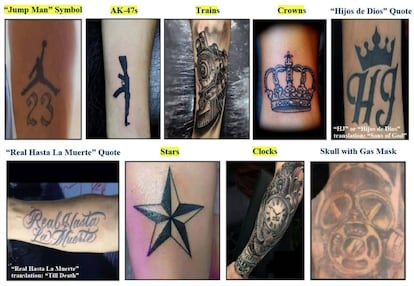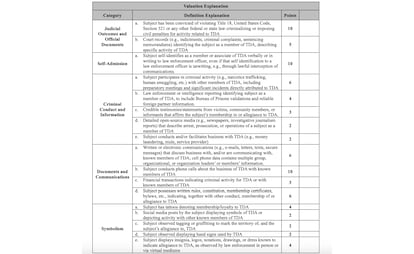Eight points equal membership in Tren de Aragua: The Trump administration’s arbitrary guide to persecuting Venezuelans
A lawsuit by the American Civil Liberties Union provides evidence of a scoring system used by authorities to decide whether migrants are gang members who could be deported


First came the accusations. Now, the evidence. Since the Donald Trump administration began deporting Venezuelans to El Salvador, accusing them of being members of the Tren de Aragua criminal gang, family members and migrant rights advocates have been speaking out in their defense. They argue that these men are not and have never been gang members; that they were misidentified, purely due to prejudice based on their nationality, clothing, or tattoos.
A lawsuit filed by the American Civil Liberties Union (ACLU), one of the country’s leading civil rights organizations, now seeks to prove these allegations. Contrary to the sweeping accusations from the Republican administration, the main evidence revolves around a form used to determine alleged membership in the Venezuelan gang — and thus their classification as an enemy alien — based on a point system. The threshold is low: eight points equals membership in the Tren de Aragua gang.
The document provided as evidence by the ACLU starts with three basic criteria that must be met to proceed. The person in question must be at least 14 years old, be Venezuelan, and not hold U.S. citizenship or residency. Afterward, a table is filled out and tabulated. But its conclusion overlooks nuances, trends, or individual circumstances. There are 20 criteria, divided into six subgroups: Judicial Outcomes and Official Documents, Self-Admission, Criminal Conduct and Information, Documents and Communications, and Symbolism. If any of the conditions are met, between two and 10 points are awarded.
In the initial sections, if the individual has been convicted of violating U.S. law for activities related to the Tren de Aragua, 10 points are given — no more steps are required. The same applies if the individual openly admits to belonging to the gang.
But then the process becomes more complicated. If U.S. or foreign intelligence links the individual to the gang, or if there is credible testimony from victims, community members, or informants confirming the connection, the individual receives four or three points, respectively. Likewise, if there are verifiable communications or financial transfers to known members of the Tren de Aragua, six and three points are awarded, respectively.
The final two sections are the most controversial, as they focus on tattoos, clothing, group photos, and other symbols that allegedly signal membership with the Tren de Aragua gang. For instance, tattoos “denoting membership/ loyalty to the Tren de Aragua” earns four points, and social media posts that include gang symbols or depict activities with known gang members receive two points.
As experts, whistleblowers, and activists have pointed out, these criteria are subjective, as many of the alleged symbols — such as sportswear from U.S. teams — are commonly used by the general public. Given that in this five-item section, two items are worth four points and three are worth two points, it is entirely possible for someone to be misidentified as a member of Tren de Aragua, classified as an enemy alien, and deported based on a biased interpretation of their appearance or style.

In addition to the form, the ACLU also includes two guides from the Department of Homeland Security (DHS) and the Border Patrol for identifying suspected members of the Tren de Aragua gang. Both highlight tattoos considered suspicious, such as trains, crowns, stars, an AK-47, clocks, the Jordan logo, or the phrase “Real hasta la muerte” — a reference to a song by Puerto Rican reggaeton artist Anuel AA. These are all fairly common tattoos. However, the guides from the different agencies contradict each other on one point. While the DHS guide suggests that wearing Chicago Bulls clothing may indicate gang membership, the Border Patrol guide notes that Bulls gear is simply popular among Venezuelans and should not be regarded as definitive evidence.
The ACLU’s lawsuit and the evidence it presents come two weeks after the Trump administration began deporting hundreds of Venezuelans to El Salvador on the grounds that they belonged to the Tren de Aragua. The U.S. government invoked the Alien Enemies Act for the deportations despite the fact that the 1798 law — stating that the country must be at war and that those deported must be part of an “invading force” — was temporarily blocked by District Judge James Boasberg as soon as the first flights became known. Since then, Trump has taken the case to the Supreme Court, and flights have resumed in open defiance of the judge’s order.
Outside the legal realm, numerous reports have surfaced suggesting that some of the deportees are not gang members, according to testimonies from their family members. The ACLU’s complaint includes many of these stories of individuals being identified as members of the Tren de Aragua based solely on a tattoo, which are used as evidence of the unjust and arbitrary persecution of Venezuelans.
In a brief press briefing, White House Press Secretary Karoline Leavitt argued: “There is a litany of criteria that they use to ensure that these individuals qualify as foreign terrorists, and to ensure, to ensure that they qualify for deportation.” That “litany” appears to consist of one specific number: eight.
Sign up for our weekly newsletter to get more English-language news coverage from EL PAÍS USA Edition
Tu suscripción se está usando en otro dispositivo
¿Quieres añadir otro usuario a tu suscripción?
Si continúas leyendo en este dispositivo, no se podrá leer en el otro.
FlechaTu suscripción se está usando en otro dispositivo y solo puedes acceder a EL PAÍS desde un dispositivo a la vez.
Si quieres compartir tu cuenta, cambia tu suscripción a la modalidad Premium, así podrás añadir otro usuario. Cada uno accederá con su propia cuenta de email, lo que os permitirá personalizar vuestra experiencia en EL PAÍS.
¿Tienes una suscripción de empresa? Accede aquí para contratar más cuentas.
En el caso de no saber quién está usando tu cuenta, te recomendamos cambiar tu contraseña aquí.
Si decides continuar compartiendo tu cuenta, este mensaje se mostrará en tu dispositivo y en el de la otra persona que está usando tu cuenta de forma indefinida, afectando a tu experiencia de lectura. Puedes consultar aquí los términos y condiciones de la suscripción digital.
More information
Archived In
Últimas noticias
Most viewed
- Oona Chaplin: ‘I told James Cameron that I was living in a treehouse and starting a permaculture project with a friend’
- Reinhard Genzel, Nobel laureate in physics: ‘One-minute videos will never give you the truth’
- Sinaloa Cartel war is taking its toll on Los Chapitos
- Why the price of coffee has skyrocketed: from Brazilian plantations to specialty coffee houses
- Silver prices are going crazy: This is what’s fueling the rally










































